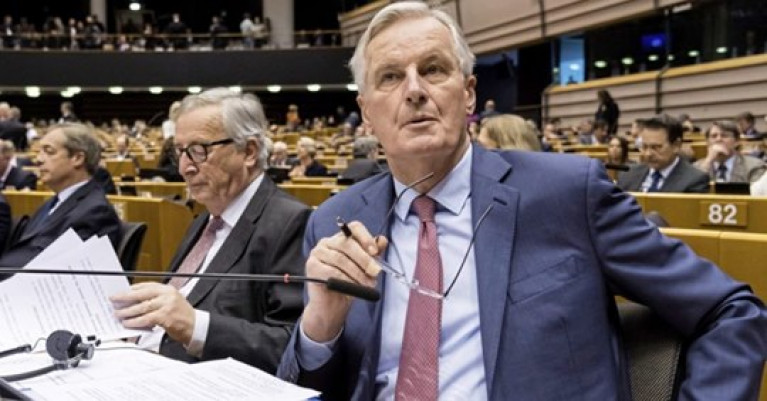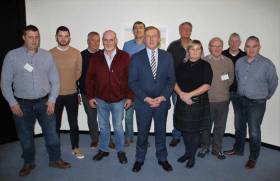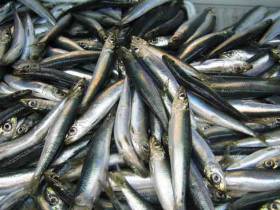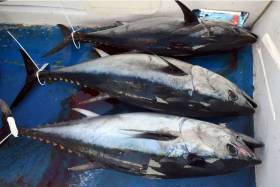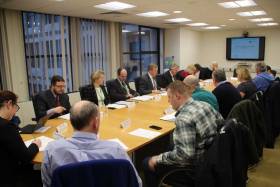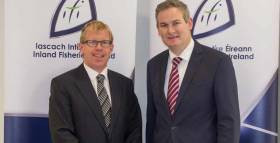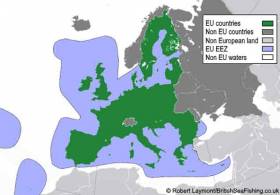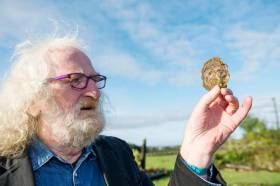Displaying items by tag: fisheries
EU Ministers Sign Off On Brussels' Red Lines Prior to Post-Brexit Trade Talks With UK
EU ministers have signed off on Brussels' red lines in advance of the forthcoming post-Brexit trade talks with the UK.
The proposals, reports The Irish News, put into writing warnings by Michel Barnier, the European Union's chief negotiator, that Britain must sign up to a "level playing field" in any free trade agreement.
The level playing field stipulation could see Brussels attempt to bounce the UK into following some EU rules and standards after the Brexit transition period ends in 2021, a concession the Prime Minister has already ruled out.
In its negotiation mandate, the EU stated that any future relationship with the UK should be "underpinned by robust commitments to ensure a level playing field for open and fair competition, given the EU and the UK's geographic proximity and economic interdependence".
On fisheries, the EU General Affairs Council, at its meeting yesterday, also agreed to negotiate to "uphold the existing reciprocal access to waters" - a move that is set to flare tensions between the UK and EU.
More on this story here which also reported that Simon Coveney said the EU was making a 'generous and fair' offer to the UK.
EU Fish Council Opens as Creed Lays Down Marker to Britain on Brexit
As EU fisheries ministers gather in Brussels today for their annual catch and quota negotiations, one Irish industry leader has warned that the impact of Brexit is already being felt with a “doubling” of non-Irish vessels fishing in these waters writes Lorna Siggins
Irish South and West Fish Producers’ Organisation chief executive Patrick Murphy warned that while “the harsh language of a “no-deal Brexit” may have softened in the run-up to the British general election”, there could be “further twists in the weeks ahead”.
Irish vessels which catch some 34% of landings off Britain will continue to be able to fish in those waters for now.
However, full British withdrawal from the Common Fisheries Policy would result in loss of Irish access and transfer of effort by other EU vessels into these waters.
The EU has a legally binding commitment under Article 148 of the withdrawal agreement with British prime minister Boris Johnson to discuss fishing access and trade together.
Irish vessels which catch some 34% of landings off Britain will continue to be able to fish in those waters for now
However, British cabinet minister Michael Gove appeared to ignore this recently when he told Scottish fishermen that Britain would be an “independent coastal state” in full control of its waters after Brexit.
Mr Gove said that access to British waters and trade would form “two separate negotiations”, telling reporters that “I know there are some people who are worried that somehow access to our waters and access to the EU’s markets will be mixed up - absolutely not...”
Minister for Agriculture, Food and the Marine Michael Creed has laid down a clear marker that this will not be tolerated, warning that the issue of fisheries is central to agreeing a trade deal between the EU and Britain.
“What we will be saying is ‘you want your financial passporting into the European Union from the City of London and elsewhere, you want open skies and we want access to your waters’,” Mr Creed said in an interview with The Sunday Business Post.
Killybegs Fishermen's Organisation chief Sean O'Donoghue warned on RTÉ Radio Morning Ireland this morning (mon 16) that if trade negotiations stretch beyond the end of next year, a "hard Brexit" could follow for the Irish fishing industry.
Britain’s financial services sector relies on financial passporting for access to every EU state, while British airlines require an “open skies” agreement to ensure access to EU airports with minimal bureaucracy.
“That’s the quid pro quo, I mean nothing less can be countenanced for us, otherwise we lose effectively overnight a third of our fishing industry,” Mr Creed told the Sunday newspaper.
He noted that political rhetoric had raised expectations among British fishermen.
The “take back control” rhetoric “kind of resonates more with the fishing industry in terms of pulling the ladder up behind them and kicking all of us out of their waters,” Mr Creed said.
In a statement on the eve of the EU fisheries council, Mr Creed said that while there were “many challenges ahead”, there was also “significant progress” towards ensuring sustainable catches.
Mr Creed said that of 74 stocks of “interest” to Ireland, some 35 of these were now fished at maximum sustainable yield - where total allowable catches and quotas are set at levels that ensure long-term sustainability.
“This figure has been improving, year on year, since 2013,” he said.
He noted that the European Commission’s proposal includes increases to a number of important stocks for the Irish fleet, including mackerel (41% increase), haddock (30% increase), monkfish (7% increase) and megrim (3% increase) in the Celtic Sea.
Mr Creed said Ireland supported the additional measure to improve selectivity and reduce quantities of cod and whiting caught in mixed fisheries in the Celtic Sea.
Mr Creed noted that the ban on discarding fish at sea – known as the landing obligation - had been fully implemented for the first time last year.
“Implementing the landing obligation is not without its difficulties, but we will continue to work with industry and our experts in Bord Iascaigh Mhara and the Marine Institute to make it work,” he said.
Last week, a consortium of environmental non-governmental organisations in “Ocean avenger” costume staged a protest at Brussels, calling on agriculture and fisheries ministers to end overfishing.
Five non-governmental organisations, Our Fish, Seas at Risk, ClientEarth, Fishsec and Sciaena delivered a six-point plan, outlining why EU leaders must act to end overfishing to protect marine biodiversity and strengthen the ocean’s resilience against climate change.
Several months ago, EU Ombudsman Emily O’Reilly recommended that the EU fisheries council should “proactively” release documents on annual quota negotiations into the public domain.
Ms O’Reilly said that the documents should be made public at the same time as they are circulated to member states, or “as soon as possible thereafter” to “promote greater transparency of environmental information”.
Mr Creed met stakeholders, including industry representatives and environmental NGOs on November 25th, and pledged to meet them again in advance of today’s council opening.
He paid tribute those who had participated, and singled out “the contribution of the men and women of the fishing industry, who are on the front line of these changes”.
In a related development, the State’s Sea Fisheries Protection Authority (SFPA) has confirmed it intends to re-introduce weighing pelagic (mackerel/herring/blue whiting) catches at point of landing in ports to comply with EU regulations.
A highly critical audit conducted by the European Commission had recommended restoration of weighing at piers, rather than only in factories, as one of a series of measures to ensure proper controls.
SFPA chairwoman Susan Steele said the requirement would be applied to a “small portion of landings”.
“Co-operation with our officers will ensure that weighing operations are completed efficiently,” she said.
National Inshore Fisheries Forum Must Remain a Strong Voice for the Sector
The Minister for Agriculture, Food and the Marine, Michael Creed T.D., today hosted the 19th meeting of the National Inshore Fisheries Forum (NIFF) at Agriculture House, Dublin.
The Inshore Fisheries Forums, established in 2014, are currently going through a renewal process with some members coming to the end of their terms and new chairs and vice chairs being appointed to represent their region at the National Inshore Fisheries Forum.
The Minister took the opportunity to pay tribute to those who are departing: “I wish to thank all of you who stepped forward to represent your sector. Without your drive and dedication, this initiative would not have emerged as the influential voice for the sector that it has since become.” From having first met on 15 January 2015, the National Inshore Fisheries Forum has now been given seats as the inshore fishing representatives on a number of consultative platforms including the Quota Management Advisory Committee and the EMFF Operational Programme Monitoring Committee.
Noting the record of policy development of the Inshore Fisheries Forums the Minister observed, “Eight conservation measures have been introduced due to the work that started in one of the six regions which was then supported at NIFF. BIM is working with the NIFF to implement the first ever industry-led inshore strategy because the NIFF made that a priority. At times there have been challenging engagements but I sincerely hope that the proactive approach of the NIFF will continue to be felt no matter who is in the seat for their region. Facing challenges like Climate Change and the roll-out of new policies like Marine Spatial Planning it is essential that there is a strong representative voice capable of leading for the Inshore Fisheries Sector.”
A State sea fisheries officer made a protected disclosure over its levels of regulation to the Minister for Agriculture, Food and the Marine and members of an Oireachtas committee last year.
The whistleblower, an officer with the Sea Fisheries Protection Authority (SFPA) was advised to submit a protected disclosure to Mr Creed and to members of the Oireachtas committee on agriculture, food and the marine after he was informed that data breaches were being investigated.
The officer had admitted to alerting an international sustainable fishing certifying body about under-recording of catches of herring when he believed his initial reports to his employer were not being acted upon, as The Sunday Independent reports today here.
The officer first became concerned in 2012, when the prestigious Marine Stewardship Council (MSC) awarded a sustainable accreditation to the Celtic Sea herring fishery.
The officer believed the MSC was not aware of under-recording in the region of 50 per cent of catch returns in four Irish fishery harbours.
The officer says he notified his superior on October 31st, 2012, but says no enforcement action was taken by the SFPA at that time, and he then contacted the MSC.
The Celtic Sea herring fishery lost its MSC sustainability certification early in 2018.
This year’s autumn herring fishery had to be closed to all vessels just several days after it opened last month when undersized fish were landed.
A spokesman for Mr Creed told The Sunday Independent that “the protected disclosure referred to deals with operational fisheries control matters, responsibility for which rests with the SFPA”.
“ The minister has been copied with the relevant documents and he is aware of the issues and the concerns. As the matter is legally within the remit of the SFPA, it has undertaken actions in relation to the issues raised and has advised the minister of same. The minister has asked the SFPA to keep him informed by of any further developments”, it said.
The SFPA refers to one protected disclosure on its website which states that “the issues are being assessed and investigated as appropriate”
Transparency International Ireland chief executive John Devitt said that weaknesses in the 2014 Protected Disclosures Act meant that the focus was on protecting the person making the disclosure, but not on taking action - with some exceptions where there is an issue of compelling public interest.
Under the terms of a new EU directive due to be transposed into Irish law, State bodies will have to respond within a timeframe, Mr Devitt noted.
EU fishing rules
Separately, the European Commission has already ordered Mr Creed’s department to conduct an administrative inquiry into its ability to apply EU fishing rules.
The Commission said the inquiry must evaluate Ireland’s “capacity to apply the rules” which govern the management of fish catches within EU waters, and said its request arose from “the severe and significant weaknesses” detected in the Irish control system during an audit carried out in March 2018 at Killybegs, Co Donegal.
The European Commission has given Ireland three months to conduct an inquiry into its application of EU Common Fisheries Policy rules writes Lorna Siggins
The administrative inquiry must “evaluate” Ireland’s “capacity to apply the rules” which govern management of fish catches within EU waters off this coast.
The European Commission says that its official request arises from “the severe and significant weaknesses detected in the Irish control system during an audit carried out by the Commission in Ireland in 2018”.
The EU audit identified shortcomings related to the “effective control of the weighing of catches of small pelagic (mackerel/herring) species, and issues related to underreporting of catches of these species”, the Commission says.
It also identified the “inadequate and ineffective sanctioning system for offences committed by operators and the lack of control and enforcement of bluefin tuna catches by recreational vessels”, it says in a statement.
The audit of monitoring - which is conducted by the State’s Sea Fisheries Protection Authority (SFPA) - was carried out by EU officials in March, 2018, in the largest fishing port of Killybegs, Co Donegal.
The auditors scrutinised weighing systems in seven fish factories in Killybegs, and analysed monitoring of the fleet of large pelagic vessels, some of which were found to have under-recorded storage capacity in 2014 and 2015.
The audit also identified the State’s failure to control a recreational fishery for bluefin tuna.
It found evidence that some tourist trips advertised over the internet resulted in bluefin tuna being “kept, landed and offered for sale” in breach of regulations.
Warnings of weaknesses in relation to pelagic monitoring had been flagged in a review of Ireland’s fishery control regime commissioned back in 2007 by the then Department of Communications, Marine and Natural Resources.
The 2007 review by consultants had advised that weighing of pelagic fish should primarily be undertaken at the quayside. It said weighing in factories should only continue where “strict additional control assurances” were implemented.
The Commission says Ireland’s administrative inquiry should “focus on the collection of information on these specific findings to enable the Commission to further evaluate Ireland's capacity to apply the rules of the CFP, and to assess the potential consequences of any failure to do so”.
It says the three month deadline may be extended “for a reasonable delay by the Commission, on a duly reasoned request from Ireland”.
“ After that period, the Commission will analyse the information provided by Ireland and identify if any further steps or actions are needed,”it says.
In a letter some months ago to Dr Cecil Beamish of the Department of Agriculture, Fisheries and Food, the European Commission’s fisheries directorate, DG Mare, said that a “follow up” by Ireland to address the audit findings was “imperative” as a “matter of urgency”.
Ireland defended its approach in its response to last year’s audit, but made a number of commitments – including hiring more SFPA staff and developing a protocol with the Director of Public Prosecutions.
The SFPA noted difficulties with weighing fish at the pier, as this can affect quality, and therefore value, and the method is opposed by the industry for this reason.
It said that it “operates a broad matrix of official controls”, but conceded that “total control is not possible and no single step ensures zero-risk of under declaration”.
The SFPA referred comments to the Department of Agriculture, Food and Marine. The department said the Commission's request had just been received and "is being examined".
First Industry-Led Strategy for Irish Inshore Fisheries Sector
The Minister for Agriculture, Food and the Marine, Michael Creed T.D., today was presented with the ‘Strategy for the Irish Inshore Fisheries Sector 2019-2023’. The strategy is the first industry-led blueprint for the Inshore Sector and was presented to the Minister by the Chair of the National Inshore Fisheries Forum.
The Strategy presented today follows an extensive development process involving the National and Regional Inshore Fisheries Forums which have been instrumental in supporting initiatives that seek to encourage a more sustainable, profitable and well-managed inshore fisheries sector. An inclusive approach was taken to identifying key issues and priorities for the sector, including a Steering Group with industry and State partners, a dedicated workshop and public consultation.
Welcoming the Strategy, Minister Creed commented:
“I am delighted to receive the ‘Strategy for the Inshore Fisheries Sector 2019-2023’. The Strategy marks a major milestone in the work of the Inshore Fisheries Forums who, since their inception, have developed initiatives seeking to protect the future of a sector which is extremely important for Irish coastal communities. I would like to thank the Forums for their support in the development of the Strategy and I look forward to seeing the outcomes it achieves.”
The Strategy sets a number of objectives that will frame the work of the Inshore Forums as industry representatives and Bord Iascaigh Mhara (BIM) as the development agency, providing a clear direction for the development of the inshore sector over the next number of years. BIM will lead the implementation plan, in partnership with the National Inshore Fisheries Forum, to deliver the actions to underpin a sustainable future for the sector. The strategy will target financial support available under the European Maritime and Fisheries Fund to where it can be most effectively used.
The Minister also announced that he has approved an increase to the minimum conservation reference size for brown crab. This new conservation measure, which was initiated by members of the fishing industry in the South East, will increase the minimum size of brown crab that can be landed by Irish sea-fishing boats from ICES areas VI and VII to 140mm. The Minister invited the National Inshore Fisheries Forum and the marine agencies to submit views on an appropriate lead-in period for the new measure.
Minister Creed said:
“I am pleased to announce the approval of this conservation measure, particularly as it was initiated and developed by inshore fishermen who recognise the importance of cultivating a sustainable fishery. I would like to thank the Inshore Fisheries Forums and their members for continuing their proactive approach to conservation issues in the inshore sector.”
The approval of the conservation measure follows an extensive consultation process involving the National and Regional Inshore Fisheries Forums and a public consultation that was held in 2018. Industry proposed the increase as a way of supporting the sustainability of the brown crab fishery by allowing brown crab more time to reproduce. An appropriate lead-in period will be identified and the measure will be implemented by statutory instrument.
The Minister also congratulated the new Chair of the National Inshore Fisheries Forum, Trudy McIntyre from the South East Regional Inshore Fisheries Forum.
“Trudy brings a wealth of knowledge and experience to her new role at a very important time in the Irish inshore sector and has already been instrumental in supporting initiatives in the inshore fisheries sector, including the first Inshore Fisheries Strategy. I wish Trudy every success and I look forward to working with her.
The Minister went on to say:
“I would like to take the opportunity to thank Alex Crowley for his work as Chair of the National Inshore Fisheries Forum. Alex has done an outstanding job and he has been resolute in his commitment to the development of the inshore sector.”
Sean Kyne TD, Minister with responsibility for the Inland Fisheries Sector today welcomed Inland Fisheries Ireland‘s announcement that, at a positive and constructive meeting of its Fish Farming Working Group, it was confirmed by IFI that they will continue to produce fish and make them available to angling clubs throughout 2018, and thereafter.
The Fish Farming Working Group is comprised of members of Inland Fisheries Ireland’s Board and Executive as well as the two main trout angling organisations, the Trout Angling Federation of Ireland (TAFI) and National Anglers Representative Association (NARA).
IFI also outlined its actions taken to date in relation to tendering for the design of a new fish farming facility and, at its subsequent January Board meeting held on the 31st of January, the Board agreed to proceed with a tender for this project. The Board had previously confirmed its commitment to developing a comprehensive strategy to meet current and future trout production needs, subject to securing the investment required.
Minister Kyne said: “The future success and development of the sector depends on the close co-operation and constructive approach of both IFI and the stakeholders, pulling together for the greater good. The fact that the Fish Farming Working Group has begun 2018 with such a positive meeting is very much to be welcomed and I look forward to hearing more, and being part of, similar productive dialogue over the coming months and years.”
The Minister also welcomed the Group’s discussions, in the context of the future advancement of the sector, on the wider development of youth angling generally and the potential for developing urban angling locations.
The next meeting of the Working Group is currently scheduled for late February.
EU Fisheries Committee Will Visit Cork in 2018
MEP for Ireland South and Leader of Fine Gael in the European Parliament, Seán Kelly, has said that the Parliament's Fisheries Committee has confirmed it will visit Cork in 2018 on a fact-finding mission, most likely in the second half of the year. While expressing disappointment that the mission will not take place in the first six months of 2018 as had been hoped, Mr Kelly confirmed that he has been assured that the Cork visit will proceed nonetheless.
“I have been in the process of organising this important fisheries mission for the past number of weeks. While it is disappointing that the visit will not happen in the first half of 2018, I can confirm that the Committee has committed to a fact-finding mission to Cork in 2018. It is unfortunate that the visit will happen a little later than previously envisaged especially with regard to important Brexit negotiations, however I look forward to confirming a new timetable for the visit in the coming months.
"It is of paramount importance that this cross-party group of MEPs comes to Ireland to meet with key Irish fisheries stakeholders for a first-hand account of the difficulties that the Irish fisheries sector will face in the wake of Brexit.
"Just last year I hosted a delegation of MEPs and policymakers belonging to the Industry, Research and Energy Committee on a visit to Cork, where we visited the Marine Renewable Energy Ireland (MaREI) to hear about the potential of wave energy at University College Cork. Providing on-the-ground opportunities for policymakers to meet local people in related industries have an added value and assist in ensuring everyone is well briefed on Member State issues.
“I will work to push for this mission to take place as soon as possible in 2018 as it is vital that the concerns of our fishing sector are outlined directly to these key decision makers," added Mr Kelly, a Member of the Fisheries Committee.
Native Oyster Fisheries Highlighted at Clarinbridge Festival
A Native Oyster Workshop has drawn on heritage and science to highlight the importance and future of the Native Oyster fisheries across Ireland during the Clarinbridge Oyster Festival.
Cuan Beo, a recently formed community based organization established with a mission of improving the quality of life, environment, economy and heritage around Galway Bay highlighted the need for action to restore the Native Oyster stocks across Ireland during the Native Oyster Workshop (NOW17) which was held in Clarinbridge last week Thursday 5th October 2017.
The workshop brought together Native Oyster Fishermen from the 8 remaining oyster fisheries in Ireland together with the relevant agencies responsible for their governance to develop a plan towards their restoration. The workshop heard that the native Oyster fisheries have been in decline for the past 200 years and are currently at an all-time low. Factors such as poor water quality, absence of fishery management plans, complex governance structures and overfishing have all contributed.
According to Diarmuid Kelly, Chairman of Cuan Beo, the aim of the workshop was to review the current status of the Native Oyster fisheries along the Atlantic coast of Ireland, to discuss the issues impacting on their productivity and identify a roadmap towards the effective management and restoration of Oyster Beds and to restore sustainable production output from these fisheries.
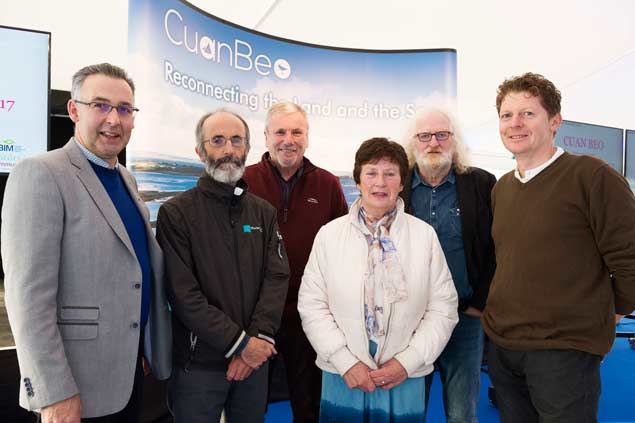 Cuan Beo committee members Diarmuid Kelly, Kelly's Oyster, Ollie Tully, Marine Institute, Seamus Breathnach BIM, Mary Gerry O'Halloran, and Colm O'Dowd Photo: Andrew Downes
Cuan Beo committee members Diarmuid Kelly, Kelly's Oyster, Ollie Tully, Marine Institute, Seamus Breathnach BIM, Mary Gerry O'Halloran, and Colm O'Dowd Photo: Andrew Downes
While Galway and Clarinbridge is synonymous with the oyster, its ecological status is poor. The situation is similar across Europe. It is listed by OSPAR as ‘threatened and declining’ and is listed as a priority habitat in the UK and in many areas in Ireland, including Galway Bay. The native oyster is subject to conservation objectives and is seen as a significant component species in Special Areas of Conservation (SACs). The workshop heard that much of the legislation is complex, misinterpreted and misunderstood.
Prof Noel Wilkins (NUI Galway) presented on the history of the native oyster beds in Galway Bay from times of super-abundance and tracking their decline to the present day. This was coupled with presentations from government agencies including the Marine Institute, the SFPA, Waters and Communities and BIM highlighting challenges relating to their restoration including licensing and governance, disease, water quality, fisheries management and displacement by invasive species. Case studies from successful fisheries were presented from Lough’s Agency in NI and Tralee Co-op.
An action plan was agreed at the workshop to create a national working group in the coming weeks. The group would not just lobby for simplification in governance but also to address assessment and up-skilling of existing co/op management in each area and the provision of support and assistance in developing management plans for each fishery. BIM agreed to coordinate the establishment of this working group.
The day-long event concluded with the official launch of Cuan Beo, by Cllr Eileen Mannion Caothairlaoch of County Galway. The launch was also attended by Seán Kyne TD Minister of State at the Department of Rural and Community Development and the Department of Communications, Climate Action and Environment with responsibility for Natural Resources, Community Affairs, and Digital Development. Niall Sabongi (KLAW Restaurant Dublin) held a masterclass in oyster tasting with a selection of native oysters from the various fisheries across Ireland and the event was concluded with a lecture highlighting the importance of the oyster in Galway Bay from pre-historic times (4000BC) to the present day by Local Archaeologist and historian, Michael Gibbons.
Fishery Offence Summonses Halted Pending Amended Legislation
#Angling - Legal actions against poaching and other illegal angling and fisheries activity have hit a stumbling block after it was found that Inland Fisheries Ireland (IFI) does not have “explicit power to prosecute offences”.
The Department of Communications, Climate Action and Environment has called a halt to any summonses currently before the courts until necessary amendments to the Fisheries Acts are enacted.
IFI says it is considering whether fresh summonses can be issued at a later stage when the amendments are in place. In the meantime, any alleged offenders remain liable to prosecution.



























